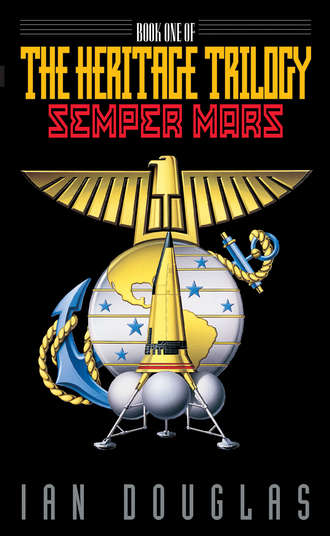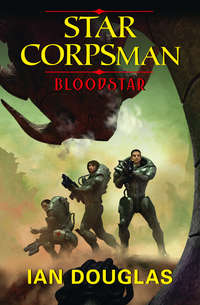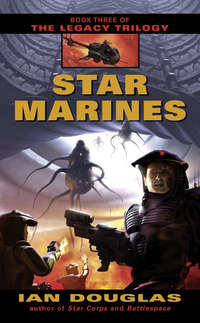
Полная версия
Semper Mars
“If they get here,” Larabee put in.
Warhurst chuckled. “We’re talking TR-5s, Sergeant. Probably with Valkyries on CAP. They’ll get here. I don’t think the whole Mexican Air Force has anything more modern than a couple dozen old F/A-22s.
“In any case, Major Bainbridge wants you men to be on your toes. Those Peregrines’ ETA is in another twenty minutes or so…and when they set down, the crowd could get a bit…eager.”
“We’ll be ready, sir.” Bledsoe slapped the side of his ATAR for emphasis, a sharp crack of palm on plastic.
“I know you will. Carry on, Marines.” He turned and disappeared into the Residence.
“Hey, Bled. Is it true what they say about that guy?”
“About him bein’ the commandant’s son? Sure is. I got the straight shit from Dolchik in Personnel.”
“I’ll be damned. He’s not a bad sort, for the son of God.”
“Well, I’ll tell you. I’d rather have him at my back in a firefight than some of these new-Corps pukes.”
“Roger that.” They listened for several minutes more to the speech barking from the speakers outside the embassy walls. A final pronouncement sent the crowd wild, cheering and screaming and swearing and shouting, until Bledsoe thought they must be planning to knock down the walls by sheer volume alone. Another volley of garbage hurtled over the fence, bouncing and scattering across the lawn beneath one of the compound’s spreading cypress trees but coming nowhere near the two Marines and their sandbag-barricaded post.
Bledsoe slung his rifle—with the crisis on, they were not required to remain rigidly at attention, soldiers on parade, as they would have been otherwise—and pulled his PAD out of the thigh pocket in his fatigue pants. When he touched the wake-up key, a keyboard and a display screen winked on, and he began tapping at the unyielding flat surface.
“Whatcha doin’?” Larabee asked.
“Linking in to the security net,” Bledsoe replied. Several perimeter camera views were available over the general embassy net. “Ah. Here we go.”
His PAD’s display screen flickered from the logo of the embassy’s local server to a low-res, real-time image shot from one of the small security cameras perched atop the compound wall. The scene looked out across the Paseo de la Reforma, Mexico City’s Great White Way, a broad and skyscraper-lined boulevard that was now smothered in a seething, shifting mass of humanity. A short distance up the road, El Angel stood gracefully on her pedestal, a towering monument to Mexican independence; a dozen men had swarmed up her base to a vantage point well above the heads of the crowd. Beyond, the elegant but aging facade of the Maria Isabel Sheraton was nearly lost behind the surging mob.
Several rocks clattered off the embassy gate.
“Get a load of this,” Bledsoe said, handing the PAD to Larabee. He pointed to the display. The security camera had clearly picked up a number of Mexican soldiers—in full battle gear—gathered in a small group in front of the Sheraton Hotel.
“Are they watching the mob?” Larabee wanted to know. “Or getting ready to join in?”
“Damfino,” Bledsoe replied. “Maybe they don’t know either. They might be there just to make sure the rocks don’t get thrown at Mexican property.”
“Yeah, but if a few gringos get dinged up, no big deal, right?”
Bledsoe set the PAD on top of the sandbag barricade and unslung his assault rifle. He didn’t like the looks of that crowd—too many tough-looking and angry young men, and no women or children visible at all. If this was really a spontaneous demonstration, like the local sources had been saying, he would have expected to see a more broadly distributed mix representing the local demographics.
Not something that looked more like an army than a mob of demonstrators….
United States Embassy
Mexico City, República de
México
1512 hours local time
“Come in.”
Captain Theodore Warhurst opened the door and entered the large room—all deep carpets and oak paneling and framed photographs and oils—that was the office of Franklin R. Tibbs, the United States ambassador to Mexico. The scene inside was one of quiet, almost deliberate confusion, as aides transferred stacks of papers from gaping filing cabinets into boxes and piled them up. As Warhurst approached the desk, three more undersecretaries came into the room, hurried past him, and collected several of the boxes; the shredding machines down the hall were working continuously now, reducing American diplomatic secrets to unrecoverable confetti.
It was a curious statement about the culture, Warhurst thought, that government bureaucracies still depended on vast quantities of hard copy to keep their records and pass their orders, despite the omnipresence of computer systems that made such wholesale deforestation unnecessary.
Ambassador Tibbs, a heavy, florid man in a neatly tailored gray suit, was packing jewel boxes into his attaché case. Each small, flat box securely held a neatly ordered array of twelve CMC microdrives. The size of a pencil eraser, each color-coded computer memory clip looked, in fact, like a small jewel and was far more precious; a single CMC carried half a gig of storage.
“Hello, Captain,” Tibbs said, looking up. His normally jovial features were sagging, his face creased and heavy. “You talk to your people?”
“Sir!” Warhurst said, coming to attention before the desk. “Yes, sir!”
“Aw, knock off the kay-det crap, Ted. Whatcha got for me?’
Warhurst allowed his rigid posture to relax, but only a little. He’d been gung ho, been raised gung ho, all of his life, and the ingrained training of a lifetime could not be easily discarded.
“The transport will be here in another few minutes, Mr. Ambassador,” he said. “It’ll touch down on the roof heliport. I’d like you to be on the first aircraft out.”
Tibbs winced. “I wish we…we didn’t have to do this. But my orders…”
“I don’t see that we have any choice, sir.”
Warhurst could tell that Tibbs was hurting, that he literally didn’t know what to do next. A friend and confidant of three American presidents, the man had been assistant secretary of labor during Kerrey’s second term, and secretary of state under Wood until his retirement in ’35. Markham had appointed him ambassador to Mexico as a reward for years of service and generous campaign contributions.
He didn’t look like he felt very rewarded at the moment. “I just…don’t know how it came to this,” he said, his voice so soft that no one in the room could have heard him but Warhurst.
“I’m sure there wasn’t anything anyone could have done,” Warhurst replied. “God knows, you’ve been in there pitching. Sir.”
“I’m beginning to think those fanatics out there are right. We should leave that stuff on Mars where we found it. Of course it makes other countries nervous when it looks like we might try to grab it all for ourselves.”
“That’s not my department, sir,” Warhurst replied carefully. He thought that Tibbs wanted to talk, that he was trying to relieve himself of some hard-to-discuss burden, but Warhurst had never been a particularly social man and didn’t know how best to respond. “But it seems to me pretty senseless just to pretend there’s nothing there. And if we can develop aldetech, well, everybody’s gonna benefit.”
Aldetech. Alien-derived technology. The word had been coined nearly a decade before to describe the expected commercial and industrial spin-offs from the fragments of lost technology discovered at Cydonia.
“You’re right, of course,” Tibbs said, nodding. “And if it wasn’t us, it would be somebody else. The Japanese, maybe. Or the EU. They both have pretty aggressive space programs and could get to Mars by themselves in another few years, if they wanted to.” He waved toward the office’s windowless wall, in the general direction of the crowds outside. “It just seems to be such a fuss over, over nothing, really. It’s not like we’re threatening them, is it?”
“Well, it’s always something, isn’t it, sir? If it wasn’t the UN afraid we were gonna grab the aldetech for ourselves, it would be Aztlan and the plebiscite.” He made a face. “Or our refusal to disarm and become nice, docile members of the global family.”
Tibbs sagged, the hopelessness of his situation, the failure clear in his eyes. Warhurst felt sorry for the man. He’d never liked Tibbs personally, and he certainly didn’t share the man’s politics, which leaned toward globalism and the new Internationalism more than he cared for. When President Markham had decided to take a tough, anti-Internationalist stance last year, defying the UN and their plebiscite and sending a Marine section to Mars to protect American interests there, he’d left many of the globalist and pro-UN people in the government dangling, especially in State, where the Internationalist influence had always been strongest.
As a member of the United States Armed Forces, as a Marine, Warhurst could have his own opinions about politics but couldn’t take sides…not publicly, not officially. If Tibbs was looking for forgiveness, understanding, or even simply a sympathetic ear, he wasn’t gonna find it in the Embassy Guard detail. Still, Warhurst could sympathize with the man’s impossible position, believing one thing, forced to carry out orders derived from an entirely different philosophy, and then being caught in the resultant back-blast.
“Anyway,” Warhurst added, “you did all you could do. All anyone could expect.”
Tibbs nodded, though Warhurst wasn’t sure how much he’d heard. Don’t fold on me now, Ambassador, he thought. We’re not out of this yet. Not by a long shot!
“Do you need any more help here, sir? I can send up a couple of men.”
“No, Captain,” Tibbs said, straightening. “No. We’re almost done.”
Warhurst heard a sound, a distant, hollow thud, followed by something that might have been the popping of firecrackers muffled by walls and distance. “Okay,” he said. “I’ll send for you when we have the transports in sight. Meanwhile, sir, stay away from the windows. Stay away from any of the outer walls.”
He turned and hurried from the room.
United States Embassy
Mexico City, Repúublica de
México
1518 hours local time
“Shit!” Larabee said. “Here they come!”
Bledsoe didn’t need the warning. He was already on one knee, his M-29 braced atop the sandbag barricade as he covered the embassy compound’s wall. A number of Mexicans, mostly young men, teenagers, in fact, were swarming up the wall and clambering across the top.
Some of them had guns.
“Outfield, this is Homeplate” crackled from Bledsoe’s in-ear speaker. He keyed the transceiver attached to his combat rig. “Homeplate, Outfield. Go!” he replied.
“Weapons free. Repeat, weapons free!”
“Uh…copy ‘weapons free.’ Damn it, some of these guys are just kids!”
One of the attackers, straddling the wall, raised an old Armalite rifle to his shoulder and fired, the round shrieking off the bricks of the Residence a few feet behind Bledsoe’s head. He shifted aim slightly and squeezed the trigger on his M-29, a light touch only that loosed a quick, three-round burst, exploding the gunman’s chest before the recoil had time to kick the weapon up and back in his hands. The man pinwheeled back off the wall in a spray of scarlet. More gunshots, from the upper floors of buildings across the street, probed the Residence.
“Kids my ass!” Larabee growled. He fired his ATAR in short, precisely controlled bursts, knocking several more attackers off the wall. The yells and imprecations and shrieks from the crowd outside—shrieks of pain and of white-hot fury—grew louder and more shrill. He sprayed a long burst across the top of the wall, the sound like the riffling of a deck of plastic cards, but far louder. The high-velocity stream of rounds sent fragments of stone and bullet into the arms and faces of the attackers still clinging to the top.
Then they heard the growling of heavy armor, the rumble and clank of tanks moving down the street toward the embassy.
FIVE
FRIDAY, 11 MAY
Rattlesnake One
TR-5 Peregrine transport/gunship
Inbound, east of Mexico City,
República de México
1519 hours local time
“Snakebite, this is Basket. Excalibur. I say again, Excalibur.”
Lieutenant Carmen Fuentes, US Marine Corps, pressed her hand against her Mark III helmet, pressing its left speaker harder against her ear, trying to hear above the shrill whine of the TR-5 Peregrine’s jets. “Basket, Snakebite,” she replied over her helmet com. “Authenticate force release.”
“Snakebite, Basket,” the voice in her ear said again. “Authenticate Bravo-delta-delta-one-seven. Excalibur. I say again, Excalibur.”
The release code and the word “Excalibur” were also glowing in green letters, winking on and off against the message display in the lower right corner of her helmet’s HUD, the confirmation she’d been waiting for. Things had just turned nasty in Mexico City, and First Platoon, Alfa Company, was headed for a hot LZ.
Fuentes turned in her seat and caught the eyes of the rest of her platoon. They were all suited up in Class-Two armor, which made them look a bit like astronauts in EVA hardsuits…except that these suits used an active camo surface layer that mimicked the colors and shadows and light sources around them in an eerie shifting of ill-shaped reflections. The only thing Class-One had that Class-Two didn’t, in fact, was the bulky full-support backpack that turned it into a space suit in fact as well as in appearance. She couldn’t read the faces behind the dark helmet visors on either side of the Peregrine’s troops compartment, but she knew every man and woman in the section was watching her intently.
“It’s a go, Marines,” she told them over her helmet’s com system. “Mexican forces have opened fire on our people at the embassy. Basket has just relayed the codeword Excalibur. We go in, and we go in hot.”
She’d been pretty sure that they would get the go-ahead this time. Fifteen minutes earlier, the Peregrine’s pilot had alerted her that Mexican Air Force F/A-22s had tried to intercept them over the coast, and only the Marine AV-32s flying CAP on Operation Rattlesnake had stopped them from pulling an intercept. Maybe those F/A-22s had been ordered to simply escort the intruders out of Mexican airspace…but Fuentes didn’t think so. The Mexicans had been getting cocky of late, certain that the entire United Nations was behind them in their dispute with the US, and they must have known that the only way to stop the relief flight was to shoot it down.
But that shooting would take some doing. Rattlesnake Flight consisted of four Peregrines and an escort of four Marine AV-32s, superb VSTOL fighters derived from the Harrier jump jets of the last century. All of the aircraft had stealth technology, and all had sophisticated antimissile defenses. There was a good chance that they would be into the Mexican capital and out again before the Mexican air-defense net could even get them pinpointed.
“So what do you think, Lieutenant?” Corporal Steve Bellamy asked over the section’s chat channel. “Is it gonna be war?”
“That,” Fuentes replied with a singular lack of interest, “is up to the politicians.”
Fuentes herself was about as apolitical as it was possible to be…but she hated the fact that some people had questioned her allegiance, and for no better reason than the ethnic origins of her name. She happened to be the daughter of legal Mexican immigrants, born in San Diego, California, and as far as she was concerned—at least until and unless the UN Aztlan plebiscite went through—that made her an American.
Hell, if the Southwestern US was suddenly torn away to become a new country, she wasn’t gonna go with it. She’d already made up her mind to stay in the Corps and resettle wherever they sent her. She didn’t like thinking about the rumor—an ugly possibility—that all Hispanics would be forced out of the US Armed Forces if that happened, or that they might even lose their citizenship. She was pretty sure that the other Hispanics in her platoon—Garcia, Ortega, and Carle—all felt the same.
In a way, she welcomed this current crisis with Mexico. It gave her an opportunity to show everyone just where her loyalties truly lay. She’d found it interesting as she thought about the problem over these past few days, however, that her primary loyalties weren’t to the United States of America, though she considered herself a patriot and was willing to put her life on the line for her country.
Her main loyalties were to her brother and sister Marines.
She used the utility wrist-top jacked into her armor’s dataport to open a window on her HUD’s data display. Channel four showed a computer-generated map of the region northeast of the Mexico DF. The aerial relief flotilla had already cleared the Sierra Madre Oriental, flying nap-of-the-Earth up the Nautla Valley, then hurtling low across the plains of Tlaxcala. They were over Texcoco Lake now, hurtling toward downtown Mexico City at better than four hundred knots. Eighteen kilometers to go—at this speed, less than two minutes more.
“Everybody check your gear!” she called. “Ninety seconds!” She wished the Peregrine had a window so that she could see out…but, of course, every square centimeter possible of the aircraft’s hull was coated in radar-absorbing polymers. She watched as each Marine in the platoon checked the armor and ordnance of the Marine at his or her left, then repeated the inspection to the right. Gunnery Sergeant Christopher Walsh checked her over, making certain that external armor snaps were locked, that grenades were secure, that she didn’t have any “Irish pennants”—loose straps or cords dangling where they could hang up and trap her. Then she returned the favor.
“Nervous, Lieutenant?” Walsh asked her on the private channel.
“Hell, yes,” she replied. It was her first time in combat, and Walsh knew that.
“Good,” he replied, and she could just make out his grin through his dark helmet visor. “If you were sure of yourself, I’d request a transfer out of this outfit, effective yesterday. Don’t worry, L-T. You’ll show ’em!”
She was grateful that he hadn’t patronized her with a “you’ll do fine,” and more grateful still that he recognized the spot she was in. Hell, in another couple of minutes, she might find herself shooting at her relatives.
But that was because they were shooting at her family….
United States Embassy
Mexico City, República de
México
1520 hours local time
The Mexican civilians had stopped coming over the wall now; in fact, as far as Bledsoe could tell, all of the civilians had scattered and fled after those first few volleys. Bledsoe was still on his knees next to Larabee, bracing his ATAR on the sandbag wall, drawing a bead on a scrawny guy wearing officer’s epaulets who seemed to be waving the attackers on from the far side of the barred front gate. He squeezed off another burst and watched the man tumble backward onto bloody pavement.
The initial rush had been beaten back, but the attack was far from over. Something large was growling unseen on the street beyond the gate, ominous and implacable. Moments later, an old Bradley AFV lumbered around the corner, striking the closed gate in a piercing clash and rattle of metal bars. A second M-2 Bradley followed the first…and a third.
“Christ!” Larabee yelled above the din. “They’re sending in the whole frigging Mex army!”
A rotary cannon on the lead Bradley howled, its muzzle flash a flickering beacon on the turret. Both Marines hit the deck as brick and sandbag alike were pulverized by the stream of heavy metal. To the right of the main gate, a portion of the wall burst inward in a crashing shower of brick. The squat, hulking shape grinding through the breach was no Bradley, however, but an M1A2, one of the old Abrams tanks sold to the Mexicans twenty years before.
Abrams and Bradleys might be laughably obsolete by modern standards, but they were still deadly. Neither of the Marines was packing weapons that could challenge that kind of armor.
Reaching up, Bledsoe touched the transmit key on the Motorola strapped to his vest. “Homeplate, this is Outfield!” he called. “We’ve got heavy armor here, and they’re knockin’ on the goddamn front door!”
“Copy that, Outfield,” a calm voice replied. It sounded like Captain Warhurst. “We see them. You can’t do anything more out there. Come on inside.”
“Rog—”
The world exploded. The Abrams had just fired its main gun, and the round had crashed into the front of the Residence and detonated somewhere inside, behind the front door. Bledsoe and Larabee, both already flat on the front porch, were lifted several feet and slammed against their crumbling sandbag barricade.
Groping through the swirling smoke, Bledsoe looked around for Larabee. The sandbags had been scattered as though kicked by a playful giant; Larabee lay on his back where the blast had flung him, off the porch, down the steps, and several yards out into the Residence front lawn. The front of the Residence itself, never designed to take such punishment, had partially collapsed, a jagged tangle of brick and beam and splintered wood, licked about with flame. The upper stories and the rear of the large mansion were intact, but a few more direct hits by that tank and the whole structure was gonna come tumbling down.
Mexican troops were spilling from the three Bradleys now, troops better equipped than the civilians in the first wave had been, with modern assault rifles and kinevlar vests similar to what Bledsoe and Larabee were wearing. Gunfire popped and chattered; Bledsoe groped for his ATAR, dropped when the Abrams had fired, and knocked down three or four running figures. The smoke was getting thicker now, and it was difficult to acquire and hold a target. The full-auto fire from the wrecked front of the building seemed to be making the attackers cautious.
But they would be charging across the lawn and up the steps of the Residence any second now.
Bledsoe knew he didn’t have much time.
Rattlesnake One
TR-5 Peregrine transport/gunship
Mexico City, República de
México
1521 hours local time
“Landing alert, Lieutenant!” sounded in Fuentes’s headset. “Thirty seconds!” She could feel the transport’s nose coming up, could feel the change in pitch of the engines as they rotated to their straight-up, hover position.
“Roger that,” she replied.
“We can see the embassy now,” the Peregrine’s pilot added. “Looks like there’s a lot of shooting going on down there.”
Her pulse raced. Had war broken out officially, or was this just another “incident,” the kind that left widows and cripples in its wake? Had the Mexicans really been stupid enough to try a toe-to-toe slugfest with the United States?
Maybe they thought that with UN backing, they could win.
She punched in a combination on her wrist-top, then studied the low-res vid-feed from the TR-5’s nose camera as it flickered in pale black and white on her helmet display. The embassy’s broad, rooftop helipad was visible at the center of the picture; one of the AV-32s swept past her view from right to left, circling low, dropping smoke canisters that erupted in a dense, boiling gray-white fog around the embassy perimeter. There might be snipers nearby packing firepower heavy enough to bring down a Peregrine, and the smoke would hamper them when they tried to find a target. It would also screw up the enemy’s laser range finders. There was already a hell of a lot of smoke in the area; it looked like the front of the Residence might be on fire.
Two of the Peregrines, moving according to plan, were making for the helipad, where they would start taking off the embassy’s civilian staff. While a third circled the compound providing gunship support, the one carrying Fuentes’s platoon would deposit them in the compound between the Residence and the front gate. They would hold the embassy until all of the civilians were away, then hightail it back for their transports and haul-tail for the Gulf of Campeche.









